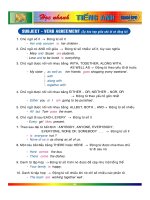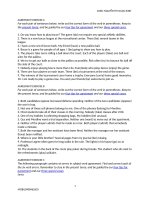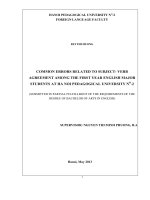29008 subject verb agreement
Bạn đang xem bản rút gọn của tài liệu. Xem và tải ngay bản đầy đủ của tài liệu tại đây (126.27 KB, 7 trang )
Subject-verb agreement
1. The indefinite pronouns anyone, everyone, someone, no one, nobody are
always singular and, therefore, require singular verbs.
χ
Everyone have done his or her
homework.
χ
Some indefinite pronouns — such as all, some — are singular or plural depending
χ
Somebody have left her purse.
on what they're referring to.
χ
Some of the beads is missing.
χ
On the other hand, there is one indefinite pronoun, none, that can be either
χ
Some of the water are gone.
singular or plural; (Writers generally think of none as meaning not any and will
choose a plural verb, as in "None of the engines are working," but when something
else makes us regard none as meaning not one, we want a singular verb, as in
"None of the food is fresh.")
None of you claims responsibility for this incident?
None of you claim responsibility for this incident?
None of the students have done their homework. (In this last example, the word
“their” precludes the use of the singular verb.)
2. Each is often followed by a prepositional phrase ending in a plural word (Each of
the cars). Each is always singular and requires a singular verb.
χ
Everyone have finished his or her homework.
χ
Each of the students are responsible for doing his or her work in the library.
3. Phrases such as together with, as well as, and along with are not the same as
and.
χ
The mayor as well as his brothers are going to prison.
χ
The mayor and his brothers is going to jail.
4. The pronouns neither and either are singular and require singular verbs even
though they seem to be referring, in a sense, to two things.
χ
Neither of the two traffic lights are working.
χ
Which shirt do you want for Christmas? Either are fine with me.
5. When nor or or is used the subject closer to the verb determines the number of
the verb.
χ
Either my father or my brothers is going to sell the house.
χ
Neither my brothers nor my father are going to sell the house.
χ
Is either my brothers or my father responsible?
χ
Are either my father or my brothers responsible?
6. The words there and here are never subjects.
χ
There is two reasons for this.
χ
There are no reason for this.
χ
Here is two apples.
7. Verbs in the present tense for third-person, singular subjects (he, she, it and
anything those words can stand for) have s-endings. Other verbs do not add sendings.
χ
He love and she love and they loves.
8. Sometimes modifiers will get betwen a subject and its verb, but these modifiers
must not confuse the agreement between the subject and its verb.
χ
The mayor, who has been convicted along with his four brothers on four counts of
various crimes but who also seems, like a cat, to have several political lives, are
finally going to jail.
9. Sometimes nouns take weird forms and can fool us into thinking they're plural
when they're really singular and vice-versa. Words such as glasses, pants,
pliers, and scissors are regarded as plural (and require plural verbs) unless
they're preceded the phrase pair of (in which case the word pair becomes the
subject).
χ
My glasses was on the bed.
χ
My pants was torn.
χ
χ
χ
A pair of plaid trousers are in the
closet.
10. Some words end in -s and appear to be plural but are really singular and require
singular verbs.
χ
The news from the front are bad.
χ
Measles are a dangerous disease for pregnant women.
χ
The names of sports teams that do not end in "s" will take a plural verb: the Miami
Heat have been looking … , The Connecticut Sun are hoping that new talent
11. Fractional expressions such as half of, a part of, a percentage of, a majority
of are sometimes singular and sometimes plural, depending on the meaning. (The
same is true, of course, when all, any, more, most and some act as subjects.) Sums
and products of mathematical processes are expressed as singular and require
singular verbs. The expression "more than one" (oddly enough) takes a singular
verb: "More than one student has tried this."
χ
Some of the voters is still angry.
χ
A large percentage of the older population are voting against her.
χ
Two-fifths of the troops was lost in the battle.
χ
Two-fifths of the vineyard were destroyed by fire.
χ
Forty percent of the students is in favor of changing the policy.
χ
Forty percent of the student body are in favor of changing the policy.
χ
Two and two are four.
χ
Four times four divided by two are eight.
12. If your sentence compounds a positive and a negative subject and one is plural,
the other singular, the verb should agree with the positive subject.
χ
The department members but not the chairperson has decided not to teach on
Valentine's Day.
χ
It is not the faculty members but the president who decide this issue.
χ
It was the speaker, not his ideas, that have provoked the students to riot.
χ
χ
χ
χ
χ
R
The expression the number is followed by a singular verb while the
expression a number is followed by a plural verb.
χ
The number of people we need to hire are thirteen.
χ
A number of people has written in about this subject.
χ
χ
χ
χ
χ
χ
R
Use a singular verb with sums of money or periods of time.
χ
Ten dollars are a high price to pay.
χ
Five years are the maximum sentence for that offense.
χ
χ
χ
χ
χ
χ
R
Collective nouns such as team and staff may be either singular or plural
depending on their use in the sentence.
χ
The staff are in a meeting.
Staff is acting as a unit here.
χ
The staff is in disagreement about the findings.
The staff are acting as separate individuals in this example.
χ
The sentence would read even better as:
The staff members are in disagreement about the findings.
χ
•
•
•
•
•
•
•
•
•
The people in our group was watching the film. ( ✗ )
A group of people was watching the film. ( )
A group of people were watching the film. ( )
Ten minutes have passed. Let’s wait five more. ( )
Two hours is a long time to wait. ( )
Hurry! There’s not many time left. ( )
Three pounds is all I’ve got. ( )
Three one-pound coins are on the desk. ( )
Three one-pound coins is on the desk. ( )
χ
The people in our group was watching the film. (The subject is people, which needs a plural
verb.)
Hurry! There’s not many time left. (Time here is uncountable and uses much.)
Three one-pound coins is on the desk. (Individual coins, not a quantity of money, needs a
plural verb.)
χ
χ
χ
Select one answer from the choices provided after each sentence.
χ
1. Either the physicians in this hospital or the chief administrator ____ going to have to χ
make a decision. (is – are)
χ
2. ______ my boss or my sisters in the union going to win this grievance? (Is – Are)
χ
3. Some of the votes __________ to have been miscounted. (seem – seems)
χ
4. The tornadoes that tear through this county every spring _____ more than just a
nuisance. (is – are)
χ
5. Everyone selected to serve on this jury _____ to be willing to give up a lot of
time. (has – have)
χ
6. Kara Wolters, together with her teammates, _________ a formidable opponent on
the basketball court.
(present – presents)
χ
7. He seems to forget that there __________ things to be done before he can
graduate. (is – are)
χ
8. There _______ to be some people left in that town after yesterday's flood.
(have – has)
χ
9. Some of the grain __________ to be contaminated. (appear – appears)
χ
10. Three-quarters of the students __________ against the tuition hike. (is – are)
χ
11. Three-quarters of the student body __________ against the tuition hike. (is –
are)
χ
12. A high percentage of the population _________ voting for the new school. (is –
are)
χ
13. A high percentage of the people _________ voting for the new school. (was –
were)
χ
Find the mistake:
1.
2.
3.
4.
5.
6.
7.
8.
The price of these jeans are reasonable.
The books borrowed from the library is on my desk.
The boy who won the two medals are a friend of mine.
Bread and butter are our daily food.
The famous singer and composer have arrived.
Collecting match-boxes are one of his favourite pastimes.
The quality of the candies are poor.
Neither his father nor his mother play mahjong.
9. Neither parent are fond of playing
mahjong.
10. None of my friends were there.
χ
χ
11. Many a student have made the same mistake.
12. Gold, as well as platinum, have recently risen in price.
13. The boss, as well as his colleagues, have been robbed by the robber.
14. Ten tons are a heavy load.
15. Fifty miles are a long distance.
16. Thirty years are a long time.
17. One of the books have been
missing.
18. The poor is suffering.
19. You should decide which one of the three choices A, B, or C best answer the
question.
20. One of the most intelligent students who scores full marks is Mostafa.
21. The only one of these most intelligent students who is under 18 is Peter.
22. One of these most intelligent students whose example are being followed is
Mostafa.
23. The home team are winning the match.
24. Thirty pounds are a lot of money for a five-year-old.
25. The police is chasing the suspect.
26. The team is travelling tonight to their next match.
27. “We have two litres of oil.” “These are enough.”
28. After finishing school, he went to Oxford University, where he studied classic.
29. He was interested in politic and was a good speaker.
30. The couple was married later that year.
31. The public still enjoys reading it today.
32. Five litres of petrol are enough for me to get to work.
33. My five-year-old sister will start a school in September.
34. The police is going to get new uniforms.
35. Fifty degrees are a very high temperature.
36. Athletics were my father’s favourite sport.
37. The people in our group was watching the film.
38. Ten minutes has passed. Let’s wait five more.
39. Two hours are a long time to wait.
40. Hurry! There’s not many time left.
41. Three pounds are all I’ve got.
42. Three one-pound coins is on the desk.
43. A three-week holiday are available every year.
44. Could I have a coffees, please?
45. Coffee can stop you sleeping.
46. I have got a hairs in my mouth.
47. There are hair on the floor.
48. Do you like chickens or meat?
49. Do you like chicken or cats?
50. I don’t like an orange, I prefer red.
51. Do you like the colour oranges?
52. Classics were a required subject long ago.
53. People is funny sometimes.
54. How much seconds is/are in an hour?
55. Ten kilometres are a long way to run.
56. One of the players in the blue team are very tall.
57. The last important occasion I went to were last year.
58. Everyone have the right to vote.
59. A number of students is ready for the race.
60. The number of students ready for the race are not enough.
61.
62.









